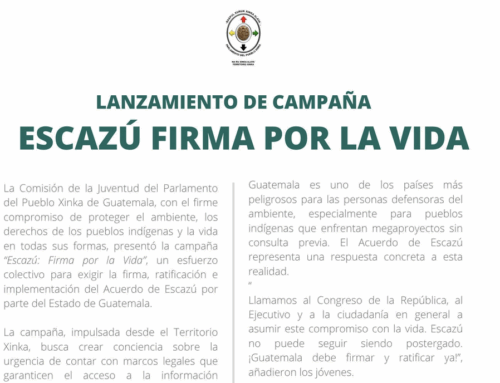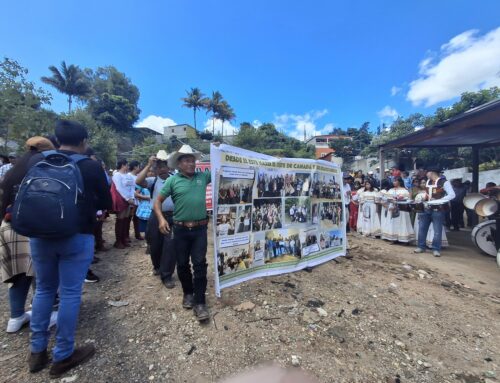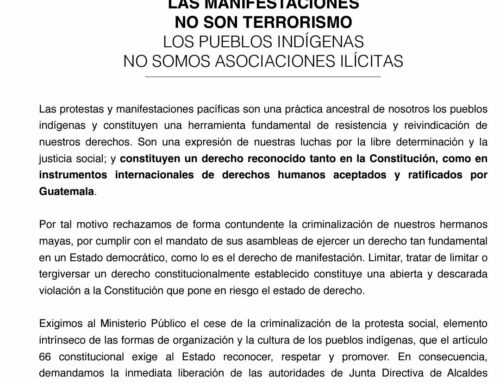Featured photo credit: Jorge Tobías Pineda Herrera
Since June 7, 2017, communities surrounding Tahoe Resources’ Escobal mine in southeastern Guatemala have maintained a 24-hour peaceful protest of mine-related traffic. They are denouncing the constant tremors they believe are the result of mining activities, the constant heavy truck traffic, and the increasing environmental impacts of the project, including the drying up of water sources.
Communities immediately surrounding the Escobal mine and others as far as the municipality of Casillas, have consistently denounced tremors, which have increased in frequency over the past number of months. The company regularly carries out underground mine blasting, which has caused damage to houses in some communities. On multiple occasions, communities in Casillas and local authorities have called on CONRED, the National Coordinating Body for the Reduction of Disasters, to visit the area and install a seismograph to measure the tremors and determine their cause. However, local confidence in CONRED’s willingness to carry out unbiased monitoring is waning as “official” results do not match what families are experiencing on a daily basis.
The blockade is located at the entranceway of Casillas, 15 kilometers down the road from Escobal, and has prevented mine-related vehicles from accessing the mine in the municipality of San Rafael las Flores. Tahoe’s subsidiary Minera San Rafael (MSR) relies on diesel-powered generators to provide the vast amount of electricity required for mining operations given that the company was denied access to the local power grid located in the neighboring municipality of Mataquescuintla. In 2012, residents from Mataquescuintla overwhelming rejected the presence of the mine and other resource extraction activities in the area and as a result, MSR was denied this critical resource.
Now, Mataquescuintla joins municipal authorities and community members in Casillas, Nueva Santa Rosa, Santa Rosa de Lima, and San Carlos Alzatate in publicly and peacefully denouncing Tahoe’s project. These same municipalities have also united to form a regional alliance (“mancomunidad”) in order to protect the river basin in the region and uphold the results of the referenda on mining. Individual communities in San Rafael las Flores, where the mine is located, have also joined the current protest, although the municipal authorities have not.
In a press conference on behalf of the regional alliance given at the resistance camp on June 11, Mataquescuintla’s Mayor Hugo Loy said, “If the seismic activity that is taking place in our subsoil is a result of mining operations, then we call on national and international bodies to intervene. Human rights and the right to life must be placed ahead of the right to material things…There are testimonies from people in Casillas and San Rafael las Flores that they feel tremors and that there has been structural damage to their homes. Mataquescuintla is no exception. Between five and six in the morning, we feel tremors as well.”
Tahoe lacks social license to operate in Santa Rosa and Jalapa; legal right to operate in question
Despite Tahoe Resources’ claim that they enjoy broad support, the results of 16 referenda in the area show otherwise. While a pro-mining mayor in San Rafael las Flores prevented a municipal-wide referendum, every other municipality in the surrounding area – and many communities within the borders of San Rafael las Flores – have held referenda in which they rejected the presence of the mine. In addition to concerns about social discord, constant tremors, and the structural damage that mining blasts are having on people’s homes in the area, communities in resistance cite major environmental concerns as one of the many reasons for their opposition. The Escobal mine is located in a large agricultural-producing area and communities are reporting that the massive amount of water to sustain mining operations is already being felt in the region.
Other attempts to halt the Escobal mine have been unsuccessful. A 2015 decision by Guatemala’s Constitutional Court effectively suspended Tahoe’s exploitation license, yet operations continue. The decision by the country’s highest court ruled that the Ministry of Energy and Mines (MEM) bypassed due process when it dismissed, without consideration, the more than 200 complaints filed by individuals who stood to be impacted by Tahoe’s mine. According to Guatemalan law, a company cannot be granted an exploitation license as long as complaints are outstanding. Instead of halting operations to allow MEM to adequately address the environmental concerns, Tahoe plowed ahead, celebrating record profits as communities suffer the very same consequences they attempted to address before Tahoe began operations.
And it’s not only the environmental impacts that communities are feeling. Individuals and entire communities who have opposed the project to defend their water, land, and livelihoods, have suffered militarization, violence, and criminalization. Last November, when community members from La Cuchilla were protesting the cracks in their houses as a result of mining operations, the General Director of Minera San Rafael wrote a letter to the Ministry of Defense, appealing for government support in keeping the peace. This wasn’t the first time that Tahoe has called for an increased military and police presence in the region. In 2013, the Guatemalan government responded by enacting a state of siege, suspending several civil liberties, and carrying out a sweep of criminalization of movement leaders.
Multiple billion-dollar pension funds in Europe have already divested from the company given concerns about violence and human rights violations in relation to the project. In its 2014 Annual Report, the Council of Ethics for the Norwegian Pension Board recommended the exclusion of Tahoe Resources from their investments, stating the company ran an “unacceptable” risk of human rights violations at the Escobal mine and that acts of violence had resulted from the company’s presence in the region. Tahoe is also excluded from the Dutch pension fund Pensionenfonds (PGB). In 2016, this fund cited “human rights abuses in Guatemala” as cause for the exclusion. The fifth edition of Dirty Profits by the German organization Facing Finance listed Tahoe Resources as one of fourteen companies considered a dangerous investment. The article highlights the lack of respect for communities, violence and militarization.
NISGUA has provided accompaniment and advocacy support to the communities impacted by Tahoe Resources’ Escobal mine since 2011.






Leave A Comment